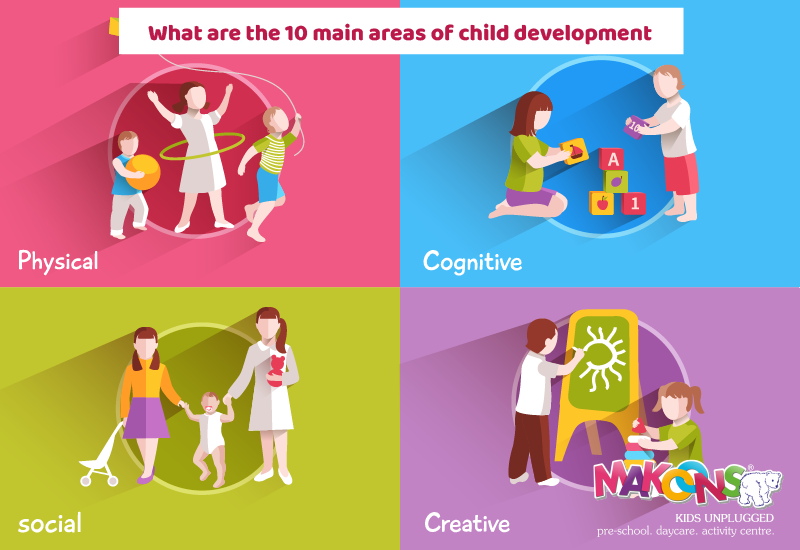One of the pleasures of life as a parent is seeing your child develop and learn. Knowing the several aspects of child development helps you to guide your child from infancy to an autonomous young person. Though each child develops at their speed, knowing what to expect at each stage of life can help you to be confident and at peace with your mind.
Early childhood growth is like seeing a lovely flower blossom: every petal opens in its own time to produce something quite remarkable. To help you better grasp and support your child’s particular path, let’s investigate the ten main areas where they will grow and develop.
1. Physical Development
The most clearly visible area of development you will find is the physical one. This covers both large motions—such as crawling, walking, and running—and little motions—such as gathering toys or painting. Your infant will go from being reliant on you to racing across the playground during early childhood development.
Look for milestones including rolling over, sitting up, first-stepping, later jumping, or bike riding. Remember, both walking at nine months and starting at fifteen months are quite normal for some children!
2. Cognitive Development
This section addresses your child’s learning, thinking, and problem-solving style. As children negotiate their environment, cognitive and emotional growth in children interact closely. This will show up when your child begins to understand cause and effect or when they start asking “why” about everything.
Cognitive development covers memory, attention span, and problem-solving thinking ability. Simple games, reading to your child, and responding to their never-ending inquiries all help strengthen this vital area of development.
3. Language and Communication Development
Language growth is quite amazing from their first cry to their first word to whole conversations. This topic covers knowing what others say as well as being able to communicate own ideas and emotions.
Though the stages of child development for language might vary greatly, most youngsters pronounce their first words around their first birthday. While some youngsters prefer to see and listen before they start babbling, others are early talkers.
4. Social Development
Social development concerns your child’s learning of social skills. Bonding with you as parents first forms the basis of this, then progressively covers siblings, friends, and other adults. Early in life, children pick up vital skills including sharing, turn-around behavior, and group play.
Your toddler may be playing parallel to other children instead of with them at first; this is quite natural. Usually, real cooperative play starts at three or four years old.
5. Emotional Development
Growing up mostly requires an awareness of and control over emotions. Children must consider their emotions too to understand them; hence, cognitive and emotional development in them is tightly related. Your child will learn techniques for managing powerful emotions and learns to recognize emotions in others and themselves.
A common feature of emotional development is temper tantrums; your child is learning to control their emotions when they cannot express their need or demands.
6. Creative Development
Creativity is about imagination, self-expression, and outside-the-box thinking, not only about creating art. Among the areas of child development are sketching, singing, dancing, pretend play, and narrative. Some Good Fun and Educational Pre-KG Activities to Do at Home is Important
Your youngster is growing creatively when they believe a cardboard box is a spaceship or scribble with crayons. These pursuits enable kids to make sense of their experiences and express themselves.
7. Moral Development
Growing children start to sense right from wrong. Children start this moral growth very early—even before they turn two—when they start to demonstrate compassion and regard for others. Learning norms, grasping fairness, and establishing their sense of what’s right constitute the stages of child development for moral growth.
Your youngster will first follow guidelines to evade punishment, but with time, their internal sense of good and wrong will grow depending on justice and compassion for others.
8. Self-Care and Independence Development
Growing up calls for a great deal of self-care knowledge. This covers everything from brushing teeth and getting ready to potty training and self-feeding. Early development in this field helps youngsters feel competent and confident.
Every little step toward independence, such as donning their shoes or assisting with table setting, helps your child develop their practical life skills and self-esteem.
9. Sensory Development
Children learn about the world around them via their sensory system. Sensual growth influences their information processing from their surroundings. Some early children seem to need more sensory input, while others are more sensitive to specific emotions.
Knowing your child’s sensory preferences can enable you to design settings where they might play and learn happily.
10. Mathematical and Logical Thinking Development
Children acquire mathematical thinking from daily encounters before they pick up formal arithmetic. Part of this growth area is counting toys, organizing objects by color, identifying patterns, and grasping ideas like “more” and “less”.
Cognitive and emotional development in kids includes logical reasoning that enables them to understand relationships, patterns, and daily life.
Supporting Your Child’s Development
Recall that every one of these facets of child development is interwoven. Your toddler might be gaining physical skills (stacking), cognitive skills (problem-solving), creative abilities (building imaginatively), and social skills (if they are playing with others).
Establishing a loving, motivating environment where your child feels free to grow and explore is the most important thing you can do. Talk to them, read with them, play games, and celebrate their achievements, independent of their apparent small scale.
Conclusion
Knowing these ten child development categories enables you to confidently support the development of your child. Recall that it is quite natural for every child to grow at their speed across the phases of development. While some kids need more help with emotional regulation, others might be social butterflies but struggle in language and take more time with physical abilities.
Also Read- Best Brain-Boosting Riddles for Kids
The most effective instruments for promoting early childhood growth are your love, tolerance, and encouragement. As a parent, trust your intuition, appreciate the little successes, and don’t panic if your child falls short of precisely on target. Your pediatrician is always there to assist you should you be worried about the cognitive and emotional growth of your child.


